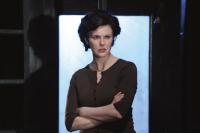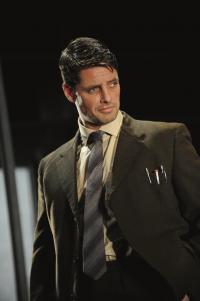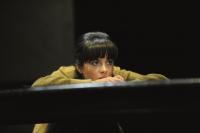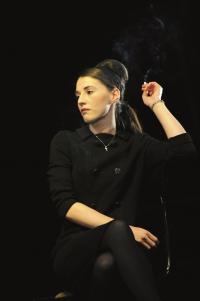Theatre eye : Big Maggie
Published in 20th-century / Contemporary History, Issue 1(Jan/Feb 2012), Reviews, Volume 20
In a towering and authoritative performance, Maggie Polpin is played by Aisling O’Sullivan as a woman who is still young and attractive, which makes her manipulation of the shallow wide boy Teddy Heelin (Keith Duffy, right) all the more effective.
The boundary between serious and popular theatre is sometimes hard to define, especially in the case of a playwright like John B. Keane, whose work straddles the boundaries between the two. Keane’s first play, Sive, was rejected by the Abbey and was first performed in his home town in Kerry by the Listowel Drama Group in 1959. The play was an instant success and won the all-Ireland drama festival. It was performed by amateur dramatic societies throughout the country, despite the fact that it dealt with aspects of Irish rural life that were often swept under the carpet or discussed in censorious tones. In the case of Sive, the main themes were illegitimacy and arranged marriage. The heroine is an illegitimate orphan who is to be forced into marriage to an elderly farmer by her scheming family and a matchmaker. Sive is practically defenceless against the forces ranged against her to break her spirit, and drowns herself at the end of the play. The play’s success reflected the immediate rapport between Keane and his audience, and the degree to which the amateur dramatic movement of the 1950s and 1960s acted as a forum for the exploration of social tensions that were straining the rigid conformism of mid-twentieth-century Irish society.  Sive set the tone for a series of highly successful plays, mainly dealing with Irish rural society from a perspective of dramatic naturalism, throughout the 1960s and 1970s. Among the best known are The Field, which opened at the Olympia in Dublin in 1965, and The Matchmaker, first performed in 1976. Both plays developed some of the themes Keane introduced in his first play. The Field reached an international audience through Jim Sheridan’s film adaptation in 1990, in which Richard Harris played the Bull McCabe, the patriarchal figure who intimidates his family and his community and ultimately murders an outsider who buys a piece of land that he covets. The play was a penetrating view of land-hunger and violence in a rural community, and had a central theme of the sacrifice of humanity to an all-engrossing obsession with money that is common to most of Keane’s plays. The Matchmaker and The Chastitute (1980) explored the parallel theme, also dominant in Sive and Big Maggie, of the suppression of sexuality and romantic love in a society dominated by puritanical morality linked to religion and the cult of respectability on the one hand, and the reduction of marriage to a commercial arrangement in a peasant society dominated by primitive accumulation and the fear of poverty on the other. Keane was also a great comic writer, and even the most tragic of his plays are leavened by his earthy satire, which was a very effective way of breaching the taboos of Irish society.Big Maggie is fairly representative of the themes of Keane’s dramatic work, but it stands out as one of his most effective plays, centred on a powerful central female figure. Unlike Sive, who is destroyed by the power plays of the society around her, including her mercenary aunt Meena, Maggie Polpin is the centre of power in the play. The tragedy is that her obsession with control only succeeds in destroying her relationships with her children. The play opens with the newly widowed Maggie impatiently winding up her late husband’s obsequies so that she can get back to business. The first item on the agenda is the family meeting, where she informs her four grown-up children of her plans for their future. One by one the children are alienated and driven out. One of the most powerful scenes is the one in which Maggie interrogates her eldest daughter about her affair with a married man, breaking her spirit and eventually forcing her to marry an elderly farmer. The eldest son is forced into exile; the younger son remains loyal to her until he in turn is forced out by her refusal to allow him to marry a local girl without a fortune. The youngest daughter falls in love with a handsome commercial traveller, until Maggie seduces him to destroy her daughter’s hopes. Always in the background to these conflicts is Maggie’s resentment at her own life.
Sive set the tone for a series of highly successful plays, mainly dealing with Irish rural society from a perspective of dramatic naturalism, throughout the 1960s and 1970s. Among the best known are The Field, which opened at the Olympia in Dublin in 1965, and The Matchmaker, first performed in 1976. Both plays developed some of the themes Keane introduced in his first play. The Field reached an international audience through Jim Sheridan’s film adaptation in 1990, in which Richard Harris played the Bull McCabe, the patriarchal figure who intimidates his family and his community and ultimately murders an outsider who buys a piece of land that he covets. The play was a penetrating view of land-hunger and violence in a rural community, and had a central theme of the sacrifice of humanity to an all-engrossing obsession with money that is common to most of Keane’s plays. The Matchmaker and The Chastitute (1980) explored the parallel theme, also dominant in Sive and Big Maggie, of the suppression of sexuality and romantic love in a society dominated by puritanical morality linked to religion and the cult of respectability on the one hand, and the reduction of marriage to a commercial arrangement in a peasant society dominated by primitive accumulation and the fear of poverty on the other. Keane was also a great comic writer, and even the most tragic of his plays are leavened by his earthy satire, which was a very effective way of breaching the taboos of Irish society.Big Maggie is fairly representative of the themes of Keane’s dramatic work, but it stands out as one of his most effective plays, centred on a powerful central female figure. Unlike Sive, who is destroyed by the power plays of the society around her, including her mercenary aunt Meena, Maggie Polpin is the centre of power in the play. The tragedy is that her obsession with control only succeeds in destroying her relationships with her children. The play opens with the newly widowed Maggie impatiently winding up her late husband’s obsequies so that she can get back to business. The first item on the agenda is the family meeting, where she informs her four grown-up children of her plans for their future. One by one the children are alienated and driven out. One of the most powerful scenes is the one in which Maggie interrogates her eldest daughter about her affair with a married man, breaking her spirit and eventually forcing her to marry an elderly farmer. The eldest son is forced into exile; the younger son remains loyal to her until he in turn is forced out by her refusal to allow him to marry a local girl without a fortune. The youngest daughter falls in love with a handsome commercial traveller, until Maggie seduces him to destroy her daughter’s hopes. Always in the background to these conflicts is Maggie’s resentment at her own life.

The youngest daughter (Sarah Green) falls in love with Heelin, the handsome commercial traveller.
Her husband was a drinker and a philanderer who condemned her to a loveless marriage while he squandered the family fortune. Her ruthlessness is partly founded on a determination that she will never again be dependent on anyone else. The corollary is that she cannot trust anyone else, least of all her own children. She is haunted by the prospect of being reduced to being the servant of one of her sons’ wives, living on sufferance. Even the proposal of marriage from Byrne, the stonemason, one of the more sympathetic characters in the play, cannot tempt her out of her fierce isolation. Maggie is a great female tragic role. Her ruthlessness contains echoes of Medea’s killing of her own children to punish Jason for abandoning her in Euripides’s tragedy. She has counterparts, both male and female, in Keane’s other plays, where characters often sacrifice their humanity and inflict terrible suffering on others in the grasping, claustrophobic world of rural society. Yet she is a complex figure, whose attitudes are characterised by an unflinching rejection of sentiment and humbug in equal measure. In the current production she is played, in a towering and authoritative performance by Aisling O’Sullivan, as a woman who is still young and attractive, which makes her manipulation of the shallow wide boy Teddy Heelin, played by Keith Duffy, all the more effective.

One of the most powerful scenes is where Maggie interrogates her eldest daughter (Charlie Murphy) about her affair with a married man, breaking her spirit and eventually forcing her to marry an elderly farmer.
(All images: Robert Day)
She stands out from all the other characters by the penetrating realism of her vision, and by comparison all the other characters are weak and, to some extent, deluded. She is a kind of primitive feminist, relentlessly pursuing her harsh vision despite the human consequences. Ultimately she pays a high price for her freedom, as do all those close to her, but even at the end maintains a stern consistency. Her unsentimental dissection of the society that created her is one of the play’s great strengths. HI
















